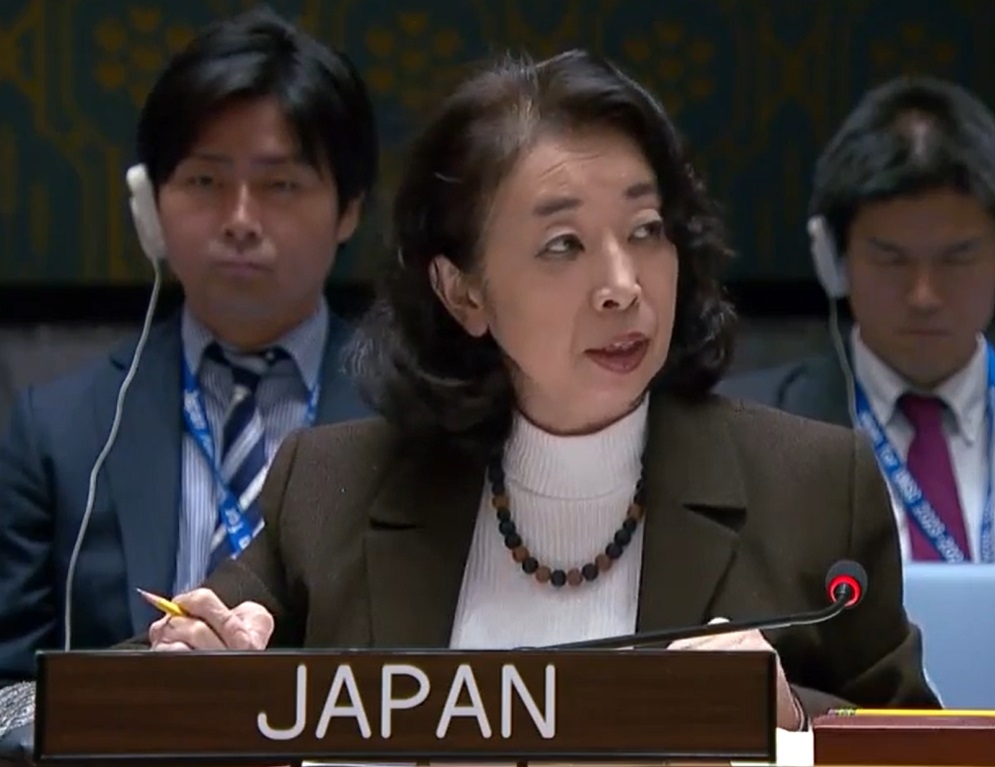Statement by H.E. Ambassador SHINO Mitsuko, Deputy Permanent Representative of Japan to the United Nations, at the United Nations Security Council Briefing, Agenda item “The situation in the Middle East (Syria)”
2023/4/27

(As delivered)
Mr. President,
I thank Special Envoy Pedersen and Ms. Doughten for their insightful briefings.
The Syrian crisis is now entering its 13th year while the devastation of February’s earthquakes continues. The plight of the people of Syria, living amidst cholera and lacking shelter, water, and electricity, remains desperate.
The opening of the two additional border crossings of Bab al-Salam and Al Ra’ee since February in addition to Bab al-Hawa crossing has been a lifeline for delivering emergency aid to the affected areas. Still, the scale and lingering effects of the disaster means greater international support is urgently needed.
The initial three-month period for these two additional crossings agreed between the UN and the Syrian Government will expire in mid-May. Given that the majority of people in northwest Syria are utterly dependent on UN assistance, we strongly appeal to the Syrian Government to extend its decision.
This month, Japan hosted the G7 Foreign Ministers’ meeting, where we reaffirmed our continued support for the earthquake victims and stressed the importance of unhindered humanitarian aid. The recent visit of our colleague Mr. MIYAKE, Special Coordinator for Syria to Aleppo with the support of UN-HABITAT gave us firsthand experience of the dire conditions on the ground. We call on international donors to engage more with Syria’s humanitarian response plan in addition to the UN flash appeal.
Only a political settlement can truly resolve the Syrian crisis, and Japan remains committed to the process outlined in UN Resolution 2254. We therefore regret that the political track remains stalled with no resolution in sight. We urge all relevant parties to constructively engage with the step-for-step approach of Special Envoy Pedersen. We are also concerned that the Constitutional Committee was not convened in almost a year. This body is an important platform to achieve a comprehensive political solution and it should not be undermined for any political reasons unrelated to Syria.
Finally, the issue of more than 100,000 missing Syrians remains a key concern. Japan is grateful for the Special Envoy’s continued prioritization of this file, including his engagement with the Syrian Government. We also appreciate the Secretary-General’s report proposing to establish a new body through the General Assembly to clarify the fate of the missing, and to provide adequate support to victims, survivors and the families of those missing, and we will constructively engage on this proposal.
There is no magic wand to solve the Syrian crisis, but we must seek to aid those in need while building trust among the parties to finally achieve a political resolution. This Council must send a strong and united message that we will not abandon the Syrian people.
I thank you, Mr. President.
I thank Special Envoy Pedersen and Ms. Doughten for their insightful briefings.
The Syrian crisis is now entering its 13th year while the devastation of February’s earthquakes continues. The plight of the people of Syria, living amidst cholera and lacking shelter, water, and electricity, remains desperate.
The opening of the two additional border crossings of Bab al-Salam and Al Ra’ee since February in addition to Bab al-Hawa crossing has been a lifeline for delivering emergency aid to the affected areas. Still, the scale and lingering effects of the disaster means greater international support is urgently needed.
The initial three-month period for these two additional crossings agreed between the UN and the Syrian Government will expire in mid-May. Given that the majority of people in northwest Syria are utterly dependent on UN assistance, we strongly appeal to the Syrian Government to extend its decision.
This month, Japan hosted the G7 Foreign Ministers’ meeting, where we reaffirmed our continued support for the earthquake victims and stressed the importance of unhindered humanitarian aid. The recent visit of our colleague Mr. MIYAKE, Special Coordinator for Syria to Aleppo with the support of UN-HABITAT gave us firsthand experience of the dire conditions on the ground. We call on international donors to engage more with Syria’s humanitarian response plan in addition to the UN flash appeal.
Only a political settlement can truly resolve the Syrian crisis, and Japan remains committed to the process outlined in UN Resolution 2254. We therefore regret that the political track remains stalled with no resolution in sight. We urge all relevant parties to constructively engage with the step-for-step approach of Special Envoy Pedersen. We are also concerned that the Constitutional Committee was not convened in almost a year. This body is an important platform to achieve a comprehensive political solution and it should not be undermined for any political reasons unrelated to Syria.
Finally, the issue of more than 100,000 missing Syrians remains a key concern. Japan is grateful for the Special Envoy’s continued prioritization of this file, including his engagement with the Syrian Government. We also appreciate the Secretary-General’s report proposing to establish a new body through the General Assembly to clarify the fate of the missing, and to provide adequate support to victims, survivors and the families of those missing, and we will constructively engage on this proposal.
There is no magic wand to solve the Syrian crisis, but we must seek to aid those in need while building trust among the parties to finally achieve a political resolution. This Council must send a strong and united message that we will not abandon the Syrian people.
I thank you, Mr. President.
